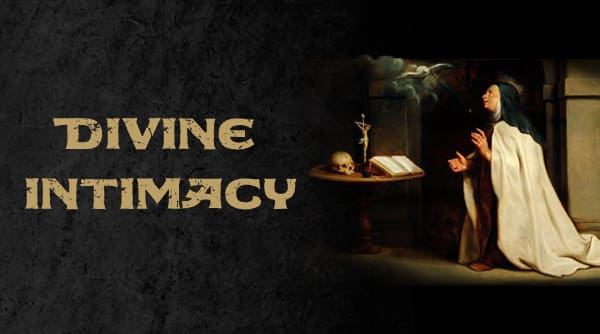Come Follow Me
Presence of God– O Jesus, obedient even unto the death of the Cross, teach us to follow Your example.
MEDITATION
Jesus said to the young man who was aspiring to perfection, “If thou wilt be perfect, go sell what thou hast, and give to the poor,”—the evangelical counsel of poverty — “and come follow Me” (Matthew 19:21)—the counsel of voluntary obedience, according to St. Thomas. To follow Jesus means to imitate His virtues, among which obedience certainly ranks first. Jesus came into the world to accomplish the will of His Father: “It is written of Me that I should do Thy will, O God” (Hebrews 10:7). Several times during His life He said it expressly: “I came down from heaven, not to do My own will, but the will of Him that sent Me” (John 6:38); and He declared that His food, His sustenance, the support of His life, was the fulfilling of His Father’s will (cf. John 4:34). But Jesus also wanted to express concretely His dependence on His heavenly Father, by submitting Himself to those creatures who in the natural order had authority over Him as man. Thus he lived for thirty years subject in all things to Mary and Joseph, recognizing His Father’s authority in theirs. “He was subject to them,” the Gospel says (Luke 2:51), as it summarizes in these few words the long years of the private life of the Savior. Later, during His public  life, and especially during His Passion, Jesus always gave an example of obedience to constituted authority, civil as well as religious, even subjecting Himself to His judges and executioners and making Himself, according to the words of St. Paul, “obedient unto death, even to the death of the Cross” (Philippians 2:8). Having come into the world through obedience, Jesus wanted to live in obedience and through obedience. He embraced death, repeating in the Garden of Olives: “Father … not My will but Thine be done” (Luke 22:42). To follow Jesus in the life of perfection means that we must voluntarily embrace a life of total dependence. St. Thomas concludes from this that obedience belongs to the essence of the state of perfection.
life, and especially during His Passion, Jesus always gave an example of obedience to constituted authority, civil as well as religious, even subjecting Himself to His judges and executioners and making Himself, according to the words of St. Paul, “obedient unto death, even to the death of the Cross” (Philippians 2:8). Having come into the world through obedience, Jesus wanted to live in obedience and through obedience. He embraced death, repeating in the Garden of Olives: “Father … not My will but Thine be done” (Luke 22:42). To follow Jesus in the life of perfection means that we must voluntarily embrace a life of total dependence. St. Thomas concludes from this that obedience belongs to the essence of the state of perfection.
COLLOQUY
“O Jesus, You would not have one that loves You well take any other road than that which You Yourself took” (cf. Teresa of Jesus Foundations, 5). And now I have decided to follow You, to walk in Your footsteps on the path of holy obedience, a way hollowed out in the solid rock of Your example, of Your most humble submission, of Your ineffable subjection. “O God, You who reign over the angels, You whom the principalities and powers obey, were subject to Mary, and not only to Mary but also to Joseph because of Mary. For God to obey a creature is humility without a parallel. O Lord, You abase Yourself, and I, shall I exalt myself? O my soul, if you disdain to imitate the example of a man, it will certainly not be unworthy of you to imitate your Creator. If perhaps you cannot follow Him wherever He goes, at least follow Him to the point to which He willed to descend for you” (cf. St. Bernard).
O Jesus, grant that I may follow You in the way of obedience; give me a profound spirit of faith so that I shall always be able to recognize Your voice and will in the command of obedience. “Teach me, O Lord, to abandon myself with confidence to Your words: ‘He who hears you, hears Me.’ Teach me to forget my own will; You appreciate this sacrifice very greatly because it makes You Master of the free will which You Yourself have given me. I wish to offer You this gift in its plenitude, with no reservation whatever. Grant that I may be faithful to this resolution and then, in spite of the repugnances and opposition of nature, I shall succeed in conforming myself to what You command; in short, whether it costs me pain or not, I shall succeed in submitting myself. I know indeed, O Lord, that You will not fail to help me, and in subjecting my reason and will for love of You, You will teach me how to become master of them. Once I am master of myself, I shall be able to consecrate myself perfectly to You by offering You a pure will, for You to unite to Your own” (cf. Teresa of Jesus Foundations, 5).
+
 Note from Dan: This post “Come Follow Me” is provided courtesy of Baronius Press and contains one of two meditations for the day. If you would like to get the full meditation from one of the best daily meditation works ever compiled, you can learn more here: Divine Intimacy. Please honor those who support us by purchasing and promoting their products.
Note from Dan: This post “Come Follow Me” is provided courtesy of Baronius Press and contains one of two meditations for the day. If you would like to get the full meditation from one of the best daily meditation works ever compiled, you can learn more here: Divine Intimacy. Please honor those who support us by purchasing and promoting their products.
Art: Detail of Holy Trinity, Masaccio, circa 1426-1428, PD-US author’s life plus 100 years or less, Wikimedia Commons. Father Gabriel of St. Mary Magdalen, mirror from open source material.




